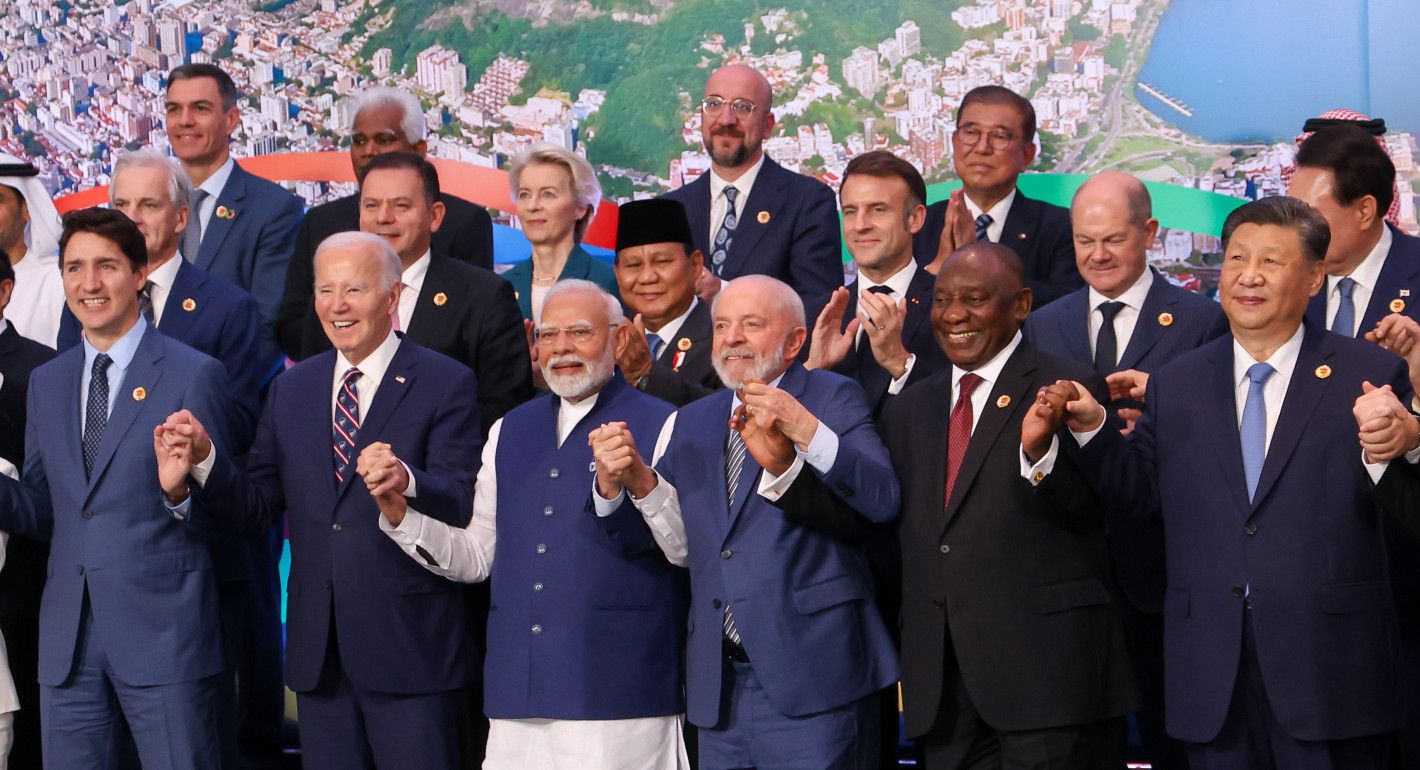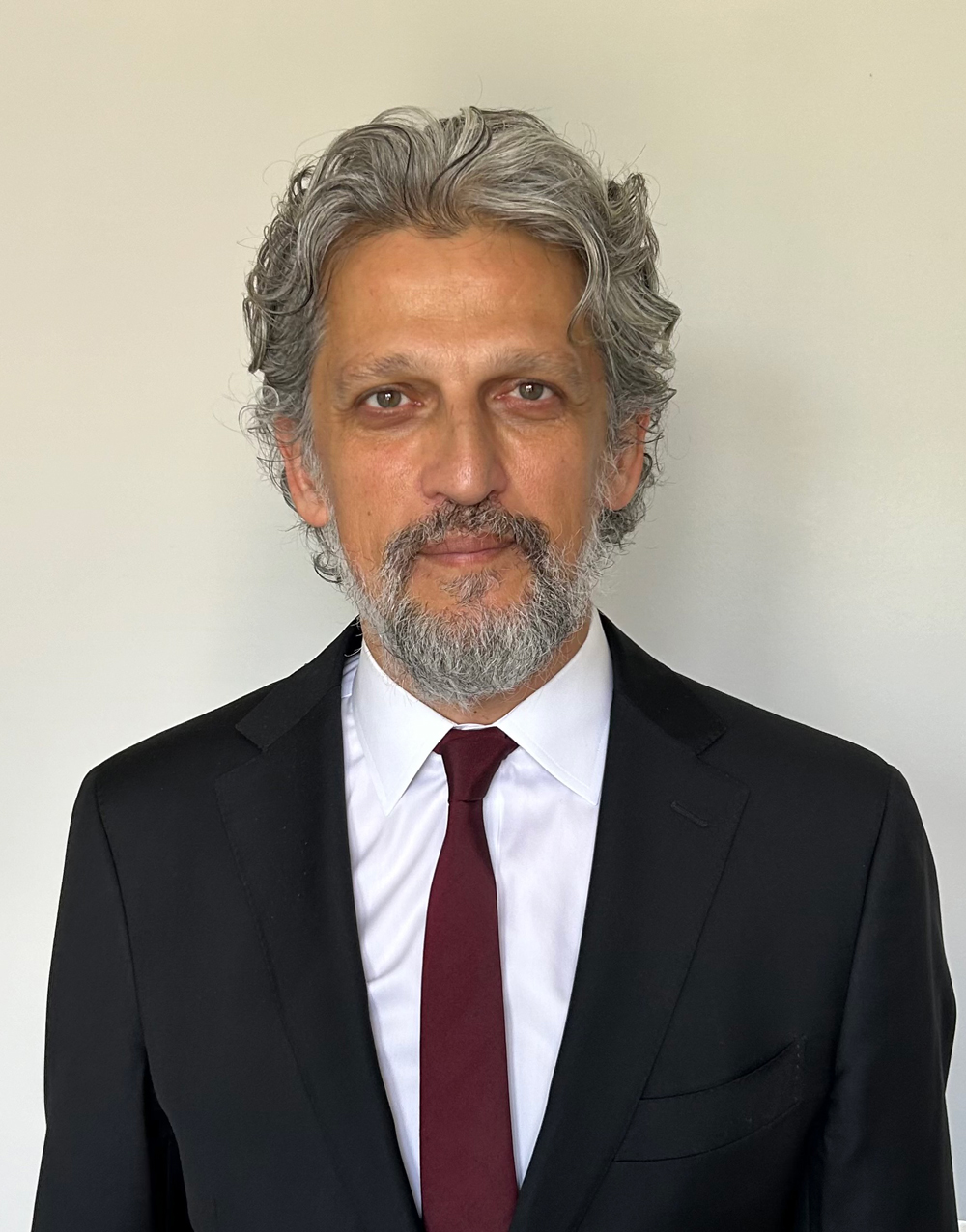Despite considerable challenges, the CPTPP countries and the EU recognize the need for collective action.
Barbara Weisel
{
"authors": [
"David McNair"
],
"type": "commentary",
"blog": "Emissary",
"centerAffiliationAll": "dc",
"centers": [
"Carnegie Endowment for International Peace"
],
"collections": [
"Carnegie Working Group on Reimagining Global Economic Governance"
],
"englishNewsletterAll": "",
"nonEnglishNewsletterAll": "",
"primaryCenter": "Carnegie Endowment for International Peace",
"programAffiliation": "GOI",
"programs": [
"Global Order and Institutions",
"Africa"
],
"projects": [],
"regions": [
"Southern, Eastern, and Western Africa",
"South Africa"
],
"topics": [
"Economy",
"Global Governance"
]
}
Leaders pose for a photo at the G20 in Rio de Janeiro 2024 on November 19. (Photo by Wagner Meier/Getty Images)
The debt limits these governments’ abilities to invest in their futures.
This essay is part of a series of pieces cosponsored by the Africa Program and the Global Order and Institutions Program and edited by Stewart Patrick, under the auspices of the Carnegie Working Group on Reimagining Global Economic Governance.
On the surface, 2025 seems an inauspicious year for South Africa to assume presidency of the G20. The election of Donald Trump likely heralds a new era of volatility and challenges to multilateralism, Europe is preoccupied with the potential escalation of war and unmanaged migration, and the BRICS grouping is increasing in stature. Achieving consensus will be a diplomatic challenge for the first African country to hold the rotating G20 leadership position.
But the disruption of this moment could provide an opportunity to make progress on a major challenge facing emerging economies and Africa in particular: the high cost of capital.
“We will use this moment to bring the development priorities of the African continent and the global south more firmly onto the agenda of the G20,” South African President Cyril Ramaphosa said at the symbolic handoff in Rio de Janeiro last month. He then laid out three priorities for the G20 presidency: solidarity, equality, and sustainability. He highlighted the importance of climate action, mobilizing finance for the energy transition, and “tackling high structural deficits and liquidity challenges” including by “seek[ing] to ensure that sovereign credit ratings are fair and transparent and address high risk premiums for developing economies.”
In the decade leading up to 2022, African debt stocks more than doubled from $283 billion to $655 billion. Contrary to the popular narrative, the largest increases were provided not by China, but by private and multilateral creditors. Debt owed by African governments to private creditors in 2022 was roughly equal to the total external debt owed by African governments a decade earlier.
In an era of historically low interest rates and with a demographic boom and massive infrastructure needs, borrowing from private creditors was logical. And prior to the coronavirus pandemic, African countries’ debt was largely sustainable. This is no longer the case: this month, twenty-three of the forty African countries evaluated by the World Bank’s debt sustainability analysis are “in distress” or at “high risk” of debt distress.
During the pandemic, African countries were hit with declining remittances and revenues from tourism. To ameliorate this challenge, the G20 launched a debt service suspension initiative (DSSI) that deferred $12.9 billion in debt payments for forty-eight participating countries. When it expired in December 2021, it was replaced by a framework for debt treatments beyond the DSSI. Chad, Ethiopia, and Zambia defaulted and entered the new framework but faced long delays in receiving resolution to their debt challenges, creating disincentives for others to apply.
Subsequently, African and other developing economies were whipsawed by inflationary pressures and responses to them. In response to the pandemic, G20 countries spent $14 trillion in stimulus packages, but the value was offset when food and energy prices spiked in the wake of Russian President Vladimir Putin’s invasion of Ukraine. Inflation peaked globally at 10.4 percent in September 2022 and in Africa at 19.8 percent in July 2021.
To calm domestic inflation, central banks implemented the fastest tightening of monetary policy since the 1980s. Because 80 percent of external debt in low- and middle-income countries is held in U.S. dollars, this increased rates immediately while strengthening the U.S. dollar against local currencies, which further increased the costs of servicing debt. Between January 2022 and March 2023, African currencies lost 8 percent of their value, increasing their debt by 10 percent of GDP.
The consequences for African countries of these exogenous shocks, which they had no role in creating, are still playing out.
In 2023, net public finance flows to developing countries turned negative. There is more money flowing out of these countries in debt service than is entering, in terms of official development assistance or new debt. While Africa’s debt service is projected to peak at $89 billion in 2024, it will remain high at $79 billion in 2025, $69 billion in 2026, and $64 billion in 2027. Fifty-two percent of 2024’s debt service is due to private creditors. This limits the ability of African governments to invest for the future. Unless they can invest public resources in education, build climate resilience, and upgrade infrastructure to support economic transformation, they are unlikely to be able to compete in a rapidly changing world.
What is often perceived as a problem of too much debt is actually something quite different. External debt-to-GDP ratios are much lower for African countries than for most advanced economies. General government net debt as a proportion of GDP is 70 percent in Kenya, 69 percent in South Africa, 45 percent in Nigeria, and 35 percent in Ethiopia. These figures are low compared to Japan (155 percent), Italy (126 percent), France (102 percent), the United States (96 percent), and United Kingdom (92 percent).
Analysis by The ONE Campaign shows that African countries are paying a 500 percent premium on their private loans in comparison to what they could achieve by borrowing from the World Bank’s International Bank for Reconstruction and Development. As a result of this premium, the debt that African countries raised from capital markets over 2016–2021 will cost these countries an additional $56 billion in interest. Together, the world’s middle-income countries are facing an additional $74 billion in unnecessary costs for the new bonds they issued in 2021 due to the premium they incur from borrowing privately. Many African countries arguably need more debt to finance their massive infrastructure needs. The challenge is that the debt available to African economies is too expensive. Estimated public finance needs for addressing the climate crisis, transitioning energy systems, and investing in sustainable development are $2.3 trillion to $2.5 trillion a year by 2030 for emerging market economies, excluding China. Unless African countries can borrow at cheaper rates, raising this kind of capital will not be possible.
Former Senegalese president Macky Sall, Kenyan President William Ruto, and a number of other African leaders have highlighted what they perceive as an unfair risk premium facing African countries. They contend that biases in the methods used by credit rating agencies to assess their countries’ creditworthiness lead the agencies to give them worse risk assessments than similar states. This forces their countries to pay more in risk premiums. The United Nations Development Program estimated that addressing biases in the methodologies of credit rating agencies could save African countries $74.5 billion annually.
In July 2023, the African Union endorsed the creation of an Africa-based credit rating agency. Such an organization would be in line with a recent African Union decision to develop more permanent solutions toward supporting Africa’s access to affordable capital.
Yet critics of this approach are skeptical that it will address the problem, given that international market signals are driven by the Big Three global credit rating agencies—S&P Global, Moody’s, and Fitch Group—and a new African agency is unlikely to change that. Others point to additional factors driving the high cost of capital, including a paucity of data, prudential regulations, and the domestic structure of African economies.
Given the fragmented nature of the challenge, the international policymaking community needs a forum where all of the key technical and political actors can come together to analyze the challenge and propose recommendations. These recommendations will then have an institutional home and momentum behind them that results in implementation over a five- to ten-year period that can weather electoral cycles and changes of leadership. The finance track of the G20 can be this forum.
Building on successful G20 finance initiatives, the South African government has proposed a Cost of Capital Commission to “deliver a comprehensive expert review on the issues impacting the cost of capital for developing economies which could help address future debt sustainability issues and the related fiscal space challenges.”
Such a commission would bring together leading experts to propose amendments to credit rating methodologies, prudential regulations, and data need. It could have enough independence from the political process to withstand geopolitical volatility but could still build enough of a consensus on the technical details to create momentum for the agenda. This agenda could then be taken forward through a minilateral approach, including via informal coalitions such as the Paris Pact for People and Planet and the Bridgetown Initiative. It could then advance in a range of different national and multilateral regulatory forums, including via European Union legislation, the Bank for International Settlements, the Basel III framework, and at the Organisation for Economic Cooperation and Development.
Within the G20, South Africa would likely find support from critical members, including Brazil, India, and Indonesia, given the priority these governments placed on these issues during their previous G20 presidencies. It also would find support within the African Union, which now has a permanent seat at the G20 table and could play a critical bridging role between G7 and BRICS members of the grouping.
This approach, which I outlined in a paper for the South African Institute for International Affairs, will be critical in managing the risk that a particular forum falls victim to geopolitical volatility. At the same time, the G20 framework would provide ample legitimacy, as the group comprises 64 percent of the world’s population, 85 percent of global GDP, and 75 precent of international trade. By seizing this opportunity, G20 nations could address one of the major challenges of our time, without the need for major fiscal expansion from advanced economies. It’s a win-win for the South African G20 presidency.
David McNair is executive director at The ONE Campaign, a member of the European Council on Foreign Relations, a founding board member at the Africa Europe Foundation. A former Carnegie nonresident scholar, he is the author of “Why Europe Needs Africa.”
The latest from Carnegie scholars on the world’s most pressing challenges, delivered to your inbox.
David McNair
Carnegie does not take institutional positions on public policy issues; the views represented herein are those of the author(s) and do not necessarily reflect the views of Carnegie, its staff, or its trustees.
Despite considerable challenges, the CPTPP countries and the EU recognize the need for collective action.

Barbara Weisel
Washington and New Delhi should be proud of their putative deal. But international politics isn’t the domain of unicorns and leprechauns, and collateral damage can’t simply be wished away.

Evan A. Feigenbaum
An Armenia-Azerbaijan settlement may be the only realistic test case for making glossy promises a reality.

Garo Paylan
Venezuelans deserve to participate in collective decisionmaking and determine their own futures.

Jennifer McCoy
And how they can respond.



Sophia Besch, Steve Feldstein, Stewart Patrick, …